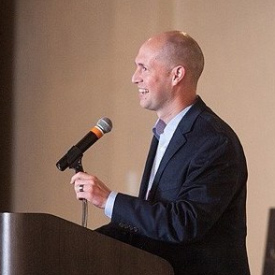Stuck in Detroit with The Rector of Justin

Leaning forward in the black and white armchair, I slowly close the back cover of The Rector of Justin, with whom I have spent much of the last day. It is fiercely cold outside and I can see the wind whipping violently through the bare trees and tall weeds of the seemingly endless snow-covered fields. The windows of my room groan with every gust.
I feel as if I am staring from the upstairs of an old farmhouse, but that sensation flits away with the sound of an airplane coming in for a landing. I am in Detroit, in a hotel room about one mile from the airport. I am not supposed to be here. A series of great mishaps led me on my own mini-odyssey of delayed flights, missed connections, rerouting through two different cities, being forced to check my bag, and the subsequent loss of that bag (it was in San Antonio, a city in which I have never touched down). Very little in the last twenty-four hours was in my control. I could not change anything.
I was, however, in the company of Dr. Prescott, the enigmatic headmaster of Justin Martyr, an Episcopal school for boys in New England. His story, unfolded slowly and powerfully in the pages of Louis Auchincloss’ novel The Rector of Justin, reminds me that my inability to change the world is not limited to comically inconvenient road trips.
Dr. Prescott was a giant, his name synonymous with excellence in education, and synonymous with Justin Martyr itself. Graduates of the hallowed institution went on to Harvard, almost as a matter of course. Prescott himself was a scholar, a football enthusiast, and he prioritized the spiritual formation of the young men – educating them in mind, body, and spirit. What more could a school do? Yet, as his life closes, he nears despair that the change he has affected appears woefully small: “Who was I to think I could change the face of American education?”
What a profound and disturbing question for we classical educators, who speak in almost identical terms so often! We talk almost incessantly of “changing the culture,” “making the world better,” and “making our mark.”
Recently, some of my students and I were engaged in comparing 5th century Rome and 21st century America, eventually asking whether the American empire could share a similar fate. Most of the students seemed to think so, unless “something big” happened to change the course. It would have to be “major.”
In following Dr. Prescott’s story, the reader also meets Mr. and Mrs. Griscam – he, a Justin Martyr alumnus and board member; her, an evangelical activist. Mrs. Griscam’s charities and causes vary throughout the story, but she was never to be found without one. But, of her it was said, “I cannot help feeling that her love for the masses must have somewhat diluted her feeling for individuals and that her family may find her a bit impersonal as a wife and mother.” And, “She loved humanity, but she looked with a misty, faintly bored benignity towards its individual specimens…”
Trying to change the world, Mrs. Griscam ignored it. Is the world meant to be viewed as an abstraction, made up of masses to be served, but not individuals; composed of culture to be changed, but not people?
Prescott’s anguished question, however, (“Who was I to think I could change the face of American education?”) was met with a beautiful answer:
“But why, sir, must you always be looking to the high goal you haven’t totally achieved? Could anyone have come any closer to it? Why can’t you ever consider instead the smaller goals that you have reached? The individual boys you’ve helped?”
“That’s all a man should look to, isn’t it?” His smile was melancholy. “Yes, Brian, I have asked too much. I have been greedy. I have helped a few boys, and I should be grateful for that.”
Was Dr. Prescott a failure? When compared with the mission statements of many classical schools, yes. But, not in the end:
Of course, nobody knows better than I that in the end Dr. Prescott deemed himself a failure, but a contrary view seemed to be overwhelmingly borne out when the great coffin, draped in the school colors of red and gold, was carried by the prefects from the packed chapel through a double row of hundreds of graduates, for whom there had been no room inside, all singing at the top of their lungs: “The Son of God goes forth to war.”
“I believe that Dr. Prescott’s true greatness lay less in the school than in his impact on individual boys.”
Prescott did change the world, not through the gargantuan “causes” and “movements” we so often envision as necessary (and even encourage in our students), but through his service to individual souls. Could any man do more? Could any of us do more than obeying what Christ Himself called the two greatest commandments? If we want to change the world, is there anything bigger than loving the Lord our God with all our heart, soul, and mind, and loving our neighbors as ourselves? Could it be that we prefer the massive cause, which allows us to love from a distance, rather than loving our neighbor?
The airline found my bag, so it seems I am stranded no more. But, I pray my time with Dr. Prescott sticks; that I learn early in my story what he learned late in his – that I am not called to “change the world” in abstractions, but to love the Lord and to love my neighbor as myself: my wife, my children, my students, and the others He brings into my path. With that, let me be both faithful and content.

Brian Phillips
Dr. Brian Phillips serves as a pastor in Concord, NC, where he lives with his wife and their four children.










